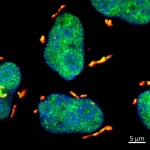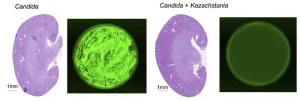(Press-News.org) The Organoid group at the Hubrecht Institute have identified a new link between FBXW7 mutations and EGFR signaling activity. The FBXW7 gene is commonly mutated in colorectal cancer and such mutations have been associated with worse treatment outcome. The researchers used colon organoids and the CRISPR/Cas9 gene editing technique to investigate the consequences of multiple common FBXW7 mutations. Further understanding of the link with EGFR signaling could help improve treatment strategies for colorectal cancer. The research was published on March 14th in Proceedings of the national academies of sciences (PNAS).
Cancer is caused by the accumulation of mutations in different genes. One commonly mutated gene is the FBXW7 gene which normally plays an important role in the protein degradation system. Although the mutation has been identified in many different types of cancer, it is most often seen in colorectal and endometrial cancer. For cancer in the colon, FBXW7 mutations are involved in 10% of patients and result in worse treatment outcome. However, the FBXW7 mutation is not yet well understood and the reason for the poor treatment outcome is currently unknown. “Therefore, we set out to completely understand the impact of these mutations, hopefully giving us a better idea of how we can treat affected patients,” says Matteo Boretto one of the leading researchers on the project.
Introducing mutations into organoids
To investigate the FBXW7 mutations the researchers used organoids which work as miniature organs that can be cultured in the laboratory. Maarten Geurts one of the leading researchers on the project explains: “We used healthy colon organoids, or mini-intestines as they closely recapitulate the organs in our body and therefore allow us to study health and disease in great detail”. The FBXW7 mutations were introduced through the CRISPR/Cas9 base editing technique. This technique enables the researchers to make specific mutations in the gene by changing the DNA code. Seven different FBXW7 mutations were introduced in the organoids, which constitute the most commonly occurring mutations in the gene.
New link with the EGFR signaling pathway
Mutations leading to colon cancer affect a wide range of signaling pathways, these consist of chains of molecules, which send messages to each other in order to activate or stop processes. One pathway that is affected by cancer is the epidermal growth factor receptor (EGFR) pathway. As this signaling chain is usually overactivated in cancer, treatment options often include EGFR inhibitors. The researchers found that FBXW7 mutations lead to increased signaling activity of the EGFR pathway and a decreased response to anti-EGFR treatment. Boretto says: “The FBXW7 gene normally plays an important role in degradation pathways by putting a small flag on the EGFR, signaling for its degradation. We hypothesize based on our data that the mutated form could no longer do so”. Without the flag, EGFR is not degraded and therefore it remains active rendering EGFR inhibitors less effective. Boretto continues: “This link between EGFR signaling and FBXW7 mutations had not been shown before.”
Improving treatment options for patients
The link between EGFR signaling and FBXW7 mutations is important to investigate in order to improve treatment options for colorectal cancer. Currently, many patients are treated with EGFR inhibitors in lack of a better option. However, since the researchers found that this treatment option is less effective for patients with the mutation who were affected by metastatic colorectal cancer it is important to fully understand this link.
Publication
EGFR is a target of the tumor-suppressor E3 ligase FBXW. Matteo Boretto*, Maarten H. Geurts*, Shashank Gandhi*, Ziliang Ma, Nadzeya Staliarova, Martina Celotti, Sangho Lim, Gui-Wei He, Rosemary Millen, Else Driehuis, Harry Begthel, Lidwien Smabers, Jeanine Roodhart, Johan van Es, Wei Wu and Hans Clevers. PNAS, 2024.
* These authors contributed equally.
******************************************************************************************************************************************************************************************************************
About Hans Clevers:
Hans Clevers is advisor/guest researcher at the Hubrecht Institute for Developmental Biology and Stem Cell Research (KNAW) and at the Princess Máxima Center for Pediatric Oncology. He holds a professorship in Molecular Genetics from the Utrecht University and is an Oncode Investigator. Hans Clevers has been the Head of Pharma Research and Early Development (pRED) at Roche since 2022. He previously held directorship/President positions at the Hubrecht Institute, the Royal Netherlands Academy of Arts and Sciences and the Princess Máxima Center for pediatric oncology.
About the Hubrecht Institute:
The Hubrecht Institute is a research institute focused on developmental and stem cell biology. Because of the dynamic character of the research, the institute has a variable number of research groups, around 20, that do fundamental, multidisciplinary research on healthy and diseased cells, tissues and organisms. The Hubrecht Institute is a research institute of the Royal Netherlands Academy of Arts and Sciences (KNAW), situated on Utrecht Science Park. Since 2008, the institute is affiliated with the UMC Utrecht, advancing the translation of research to the clinic. The Hubrecht Institute has a partnership with the European Molecular Biology Laboratory (EMBL). For more information, visit www.hubrecht.eu.
END
The use of antipsychotics during pregnancy isn’t linked to childhood neurodevelopmental disorders or learning difficulties, UNSW Sydney-led study shows – giving assurance to those concerned about continuing their medications during pregnancy.
Antipsychotics – a branch of medication designed to treat schizophrenia and bipolar disorder – are important tools for mental health care management. They work by blocking the effect of dopamine, which can help reduce psychotic symptoms such as hallucinations or delusions.
These versatile ...
For younger Black patients living in rural parts of the Southeastern United States, peer coaching is more effective than traditional clinical care in controlling high blood pressure, according to a new study led by investigators at Weill Cornell Medicine and NewYork-Presbyterian. The investigators learned that for people under age 60 who have persistently uncontrolled hypertension, the benefits of working with a peer health coach were equivalent to what would be expected from taking a low dose of blood pressure medication.
The findings were published March 18 in JAMA Internal Medicine. The randomized ...
About The Study: The findings of this study indicate that childhood lead exposure from drinking water is widespread in Chicago, and racial inequities are present in both testing rates and exposure levels. Machine learning may assist in preliminary screening for lead exposure, and efforts to remediate the effects of environmental racism should involve improving outreach for and access to lead testing services.
Authors: Benjamin Q. Huynh, Ph.D., of the Johns Hopkins University Bloomberg School of Public Health in Baltimore, is the corresponding author.
To access the embargoed study: Visit our For The Media website at this link https://media.jamanetwork.com/
(doi:10.1001/jamapediatrics.2024.0133)
Editor’s ...
Mothers and daughters have a strong bond, yet do you know that connections reminiscent of this close relationship extend all the way to the cellular level? During the process of cell division, new daughter cells inherit a mix of genetic material and other molecules from their mother cells. This inheritance includes both beneficial components, which can help them for a robust start in life, and potentially harmful mutations or damaged molecules, posing significant challenges for the newly born daughter cells. How daughter cells manage and ...
Embargoed press materials are now available for Discover BMB, the annual meeting of the American Society for Biochemistry and Molecular Biology. Top scientists and educators in the field will gather at the meeting, March 23–26 in San Antonio.
Reporters are invited to attend an exciting lineup of in-person scientific sessions in San Antonio or access press materials electronically. Register now or find more information in the #DiscoverBMB newsroom. Please note that only a limited number of complementary on-site press passes will be issued, so advance registration is recommended.
Explore the schedule at a ...
Researchers at the Weizmann Institute of Science in Israel have identified a yeast that could be used to prevent invasive candidiasis, a major cause of death in hospitalized and immunocompromised patients. The study, to be published March 18 in the Journal of Experimental Medicine (JEM), shows that the novel yeast lives harmlessly in the intestines of mice and humans and can displace the yeast responsible for candidiasis, Candida albicans.
Millions of microbial species live within or on the human body, many of them being harmless or even beneficial to human health. The microscopic yeast C. albicans is commonly found in the intestines ...
EMBARGOED FOR RELEASE
Monday, March, 18,2024
10 a.m. EDT
Contact:
NIH Office of Communications and Public Liaison
NIH News Media Branch
301-496-5787
NIH studies find severe symptoms of “Havana Syndrome,” but no evidence of MRI-detectable brain injury or biological abnormalities
Compared to healthy volunteers, affected U.S. government personnel did not exhibit differences that would explain symptoms
Using advanced imaging techniques and in-depth clinical assessments, a research team at the National Institutes of Health (NIH) found no significant evidence of MRI-detectable brain injury, nor differences in most clinical measures compared to ...
About The Study: In this exploratory study, there were no significant differences between individuals reporting anomalous health incidents and matched control participants with respect to most clinical, research, and biomarker measures, except for objective and self-reported measures of imbalance and symptoms of fatigue, posttraumatic stress, and depression. This study did not replicate the findings of previous studies, although differences in the populations included and the timing of assessments limit direct comparisons. ...
About The Study: In this exploratory neuroimaging study, there were no significant differences in imaging measures of brain structure or function between individuals reporting anomalous health incidents and matched control participants after adjustment for multiple comparisons. U.S. government personnel stationed internationally have reported anomalous health incidents, with some individuals experiencing persistent debilitating symptoms.
Authors: Carlo Pierpaoli, M.D., Ph.D., of the National Institute of Biomedical Imaging and Bioengineering in ...
Global coffee consumption generates millions of tons of spent coffee grounds each year, which can be damaging to wildlife and the environment. However, new research published in the Journal of Chemical Technology and Biotechnology reveals that spent coffee grounds could be repurposed to act as a powerful adsorbent of bentazone, a herbicide commonly used in agriculture that is highly neurotoxic.
In the study, investigators found that when they used zinc chloride to activate the carbon from spent coffee grounds, the activated carbon showed a 70% efficiency in bentazone removal. ...



